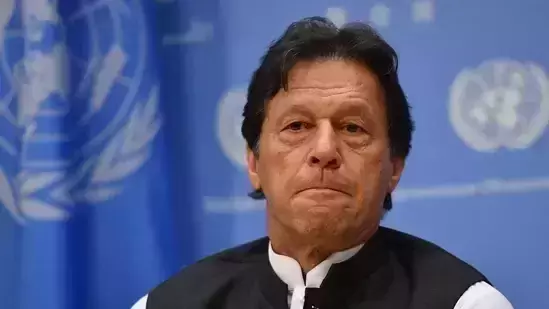
Imran Khan to be framed under Anti-Terrorism Act
text_fieldsConcerted efforts to arrest former Pakistan Prime Minister Imran Khan, who was ousted through a no-trust motion by the Pakistan National Assembly April this year, are now underway in Islamabad under anti-terrorism laws. The Islamabad High Court has nevertheless stayed the arrest till Thursday; however, Imran is expected to be behind bars if his attempt to dodge arrest fails. Accusing Pakistan Tehreek-e-Insaf of threatening the police, judiciary and other constitutional institutions during its rally in Islamabad on Saturday, the Shahbaz Sharif administration is cracking down on Khan using the Anti-Terrorism Act. The governing coalition partners including Pakistan Muslim League (N), PPP, MQM and Jamiat Ulema-e-Islam (F) have separately demanded action against Imran Khan for threatening a woman judge and insulting police officers. Pakistan is once again getting embroiled in never-ending political uncertainty and political rivalry as the country faces a severe economic crisis from devaluation of rupee and the steep rise in the prices of essential commodities.
The reasons are obvious: the military intervention that continues to challenge the nation's political stability even after 75 years of independence, political maneuvers that never allow a government to complete its term, and above all, corruption that thrives in the abuse of power. Where the profuse of bribes earned Benazir Bhutto's husband the nickname 'Mr Ten Percent' during her tenure, the Panama Papers unraveled the stories of the colossal financial manipulations carried out by Nawaz Sharif and his family when he became Prime Minister. Nawaz Sharif was thrown out of power by the Supreme Court's interventions. Declaring war against this instability and corruption, the former cricketer Imran Khan emerged launching the Pakistan Tehreek-e-Insaf. A significant section of the Pakistanis, who were tired of defection and political maneuvers found a savior in Khan, and he became the prime minister of the country with the cooperation of small parties and the support of the army. But when complaints about Pakistan's protection of terrorist organizations rang out in the UN and the US, Khan's tactics proved to be ineffective.
Aid from the United States was not coming as before. The growing antipathy against USA at home fueled by religious parties in Pakistan also hampered the US aid. India, Pakistan's neigbour and the second most powerful nation in Asia, had been taking a stern stance against Pakistan's promoting of terrorism, creating difficulties to the country. It is at this point of uncertainty that Imran Khan pursued the age-old formula of the-enemy-of-my enemy-is-my-friend, forging ties with China, the number one power in Asia and the target of the US, starting new projects with China. It is because of this annoying decision for USA that Imran Khan kept harping on that there was a big force behind his ouster. And, Imran does not hesitate to implicate the army either. Imran Khan launched his antigovernmental rallies declaring that he had been ousted by both forces and that he would rally the people and defeat the threat.
He does not hesitate to allege that 'neutrals' are behind the terror charges being leveled against him. Everyone knows that by neutrals, Imran means army. The protests have intensified after the government banned TV channels from telecasting the former prime minister's speeches live. If the former cricket captain, who has proved to be relatively popular, is charged with anti-terrorism charges and jailed, the political scene of Pakistan will become extremely chaotic.
A lasting solution to the neighborhood's three-quarter-century-long instability depends on its willingness for internal reconciliation, peaceful coexistence with neighboring countries, and a firm stance against terrorism.






















